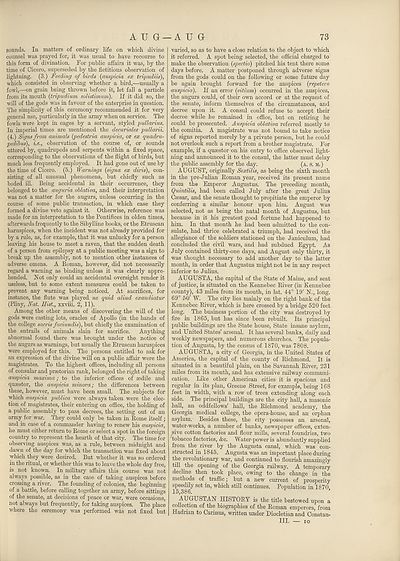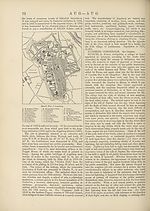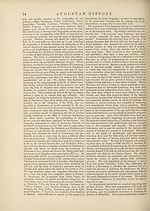Encyclopaedia Britannica > Volume 3, Athens-BOI
(85) Page 73
Download files
Complete book:
Individual page:
Thumbnail gallery: Grid view | List view

73
AUG-
sounds. In matters of ordinary life on which divine
counsel was prayed for, it was usual to have recourse to
this form of divination. For public affairs it was, by the
time of Cicero, superseded by the fictitious observation of
lightning. (3.) Feeding of birds (auspicia ex tripudiis),
which consisted in observing whether a bird,—usually a
fowl,—on grain being thrown before it, let fall a particle
from its mouth (tripudium solistimum). If it did so, the
will of the gods was in favour of the enterprise in question.
The simplicity of this ceremony recommended it for very
general use, particularly in the army when on service. The
fowls were kept in cages by a servant, styled pullarius.
In imperial times are mentioned the decuriales pullarii.
(4.) Signs from animals (pedestria auspicia, or ex quadru-
pedibus), i.e., observation of the course of, or sounds
uttered by, quadrupeds and serpents within a fixed space,
corresponding to the observations of the flight of birds, but
much less frequently employed. It had gone out of use by
the time of Cicero. (5.) Warnings (signa ex diris), con¬
sisting of all unusual phenomena, but chiefly such as
boded ill. Being accidental in their occurrence, they
belonged to the auguria oblativa, and their interpretation
was not a matter for the augurs, unless occurring in the
course of some public transaction, in which case they
formed a divine veto against it. Otherwise, reference was
made for an interpretation to the Pontifices in olden times,
afterwards frequently to the Sibylline books, or the Etruscan
haruspices, when the incident was not already provided for
by a rule, as, for example, that it was unlucky for a person
leaving his house to meet a raven, that the sudden death
of a person from epilepsy at a public meeting was a sign to
break up the assembly, not to mention other instances of
adverse omens. A Roman, however, did not necessarily
regard a warning as binding unless it was clearly appre¬
hended. Not only could an accidental oversight render it
useless, but to some extent measures could be taken to
prevent any warning being noticed. At sacrifices, for
instance, the flute was played ne quid aliud exaudiatur
(Pliny, Nat. Hist., xxviii. 2, 11).
Among the other means of discovering the will of the
gods were casting lots, oracles of Apollo (in the hands of
the college sacris faciundis), but chiefly the examination of
the entrails of animals slain for sacrifice. Anything
abnormal found there was brought under the notice of
the augurs as warnings, but usually the Etruscan haruspices
were employed for this. The persons entitled to ask for
an expression of the divine will on a public affair were the
magistrates. To the highest offices, including all persons
of consular and praetorian rank, belonged the right of taking
auspicia maxima; to the inferior offices of sedile and
quaestor, the auspicia minora; the differences between
these, however, must have been small. The subjects for
which auspicia publica were always taken were the elec¬
tion of magistrates, their entering on office, the holding of
a public assembly to pass decrees, the setting out of an
army for war. They could only be taken in Rome itself;
and in case of a commander having to renew his auspicia,
he must either return to Rome or select a spot in the foreign
country to represent the hearth of that city. The time for
observing auspices was, as a rule, between midnight and
dawn of the day for which the transaction was fixed about
which they were desired. But whether it was so ordered
in the ritual, or whether this was to leave the whole day free,
is not known. In military affairs this course was not
always possible, as in the case of taking auspices before
crossing a river. The founding of colonies, the beginning
of a battle, before calling together an army, before sittings
of the senate, at decisions of peace or war, were occasions,
not always but frequently, for taking auspices. The place
where the ceremony was performed was not fixed but
-AUG
varied, so as to have a close relation to the object to which
it referred. A spot being selected, the official charged to
make the observation (spectio) pitched his tent there some
days before. A matter postponed through adverse signs
from the gods could on the following or some future day
be again brought forward for the auspices (repetere
auspicia). If an error (vitium) occurred in the auspices,
the augurs could, of their own accord or at the request of
the senate, inform themselves of the circumstances, and
decree upon it. A consul could refuse to accept their
decree while he remained in office, but on retiring he
could be prosecuted. Auspicia oblativa referred mostly to
the comitia. A magistrate was not bound to take notice
of signs reported merely by a private person, but he could
not overlook such a report from a brother magistrate. For
example, if a quaestor on his entry to office observed light¬
ning and announced it to the consul, the latter must delay
the public assembly for the day. (a. s. m.)
AUGUST, originally Sextilis, as being the sixth month
in the pre-Julian Roman year, received its present name
from the Emperor Augustus. The preceding month,
Quintilis, had been called July after the great Julius
Caesar, and the senate thought to propitiate the emperor by
conferring a similar honour upon him. August was
selected, not as being the natal month of Augustus, but
because in it his greatest good fortune had happened to
him. In that month he had been admitted to the con¬
sulate, had thrice celebrated a triumph, had received the
allegiance of the soldiers stationed on the Janiculum, had
concluded the civil wars, and had subdued Egypt. As
July contained thirty-one days, and August only thirty, it
was thought necessary to add another day to the latter
month, in order that Augustus might not be in any respect
inferior to Julius.
AUGUSTA, the capital of the State of Maine, and seat
of justice, is situated on the Kennebec River (in Kennebec
county), 43 miles from its mouth, in lat. 44° 19' N., long.
69° 50' W. The city lies mainly on the right bank of the
Kennebec River, which is here crossed by a bridge 520 feet
long. The business portion of the city was destroyed by
fire in 1865, but has since been rebuilt. Its principal
public buildings are the State house, State insane asylum,
and United States’ arsenal. It has several banks, daily and
weekly newspapers, and numerous churches. The popula¬
tion of Augusta, by the census of 1870, was 7808.
AUGUSTA, a city of Georgia, in the United States of
America, the capital of the county of Richmond. It is
situated in a beautiful plain, on the Savannah River, 231
miles from its mouth, and has extensive railway communi¬
cation. Like other American cities it is spacious and
regular in its plan, Greene Street, for example, being 168
feet in width, with a row of trees extending along each
side. The principal buildings are the city hall, a masonic
hall, an oddfellows’ hall, the Richmond academy, the
Georgia medical college, the opera-house, and an orphan
asylum. Besides these, the city possesses an arsenal,
water-works, a number of banks, newspaper offices, exten¬
sive cotton factories and flour mills, several foundries, two
tobacco factories, &c. Water-power is abundantly supplied
from the river by the Augusta canal, which was con¬
structed in 1845. Augusta was an important place during
the revolutionary war, and continued to flourish amazingly
till the opening of the Georgia railway. A temporary
decline then took place, owing to the change in the
methods of. traffic; but a new current of prosperity
speedily set in, which still continues. Population in 1870
15,386.
AUGUSTAN HISTORY is the title bestowed upon a
collection of the biographies of the Roman emperors, from
Hadrian to Carinus, written under Diocletian and Constan-
III. — io
AUG-
sounds. In matters of ordinary life on which divine
counsel was prayed for, it was usual to have recourse to
this form of divination. For public affairs it was, by the
time of Cicero, superseded by the fictitious observation of
lightning. (3.) Feeding of birds (auspicia ex tripudiis),
which consisted in observing whether a bird,—usually a
fowl,—on grain being thrown before it, let fall a particle
from its mouth (tripudium solistimum). If it did so, the
will of the gods was in favour of the enterprise in question.
The simplicity of this ceremony recommended it for very
general use, particularly in the army when on service. The
fowls were kept in cages by a servant, styled pullarius.
In imperial times are mentioned the decuriales pullarii.
(4.) Signs from animals (pedestria auspicia, or ex quadru-
pedibus), i.e., observation of the course of, or sounds
uttered by, quadrupeds and serpents within a fixed space,
corresponding to the observations of the flight of birds, but
much less frequently employed. It had gone out of use by
the time of Cicero. (5.) Warnings (signa ex diris), con¬
sisting of all unusual phenomena, but chiefly such as
boded ill. Being accidental in their occurrence, they
belonged to the auguria oblativa, and their interpretation
was not a matter for the augurs, unless occurring in the
course of some public transaction, in which case they
formed a divine veto against it. Otherwise, reference was
made for an interpretation to the Pontifices in olden times,
afterwards frequently to the Sibylline books, or the Etruscan
haruspices, when the incident was not already provided for
by a rule, as, for example, that it was unlucky for a person
leaving his house to meet a raven, that the sudden death
of a person from epilepsy at a public meeting was a sign to
break up the assembly, not to mention other instances of
adverse omens. A Roman, however, did not necessarily
regard a warning as binding unless it was clearly appre¬
hended. Not only could an accidental oversight render it
useless, but to some extent measures could be taken to
prevent any warning being noticed. At sacrifices, for
instance, the flute was played ne quid aliud exaudiatur
(Pliny, Nat. Hist., xxviii. 2, 11).
Among the other means of discovering the will of the
gods were casting lots, oracles of Apollo (in the hands of
the college sacris faciundis), but chiefly the examination of
the entrails of animals slain for sacrifice. Anything
abnormal found there was brought under the notice of
the augurs as warnings, but usually the Etruscan haruspices
were employed for this. The persons entitled to ask for
an expression of the divine will on a public affair were the
magistrates. To the highest offices, including all persons
of consular and praetorian rank, belonged the right of taking
auspicia maxima; to the inferior offices of sedile and
quaestor, the auspicia minora; the differences between
these, however, must have been small. The subjects for
which auspicia publica were always taken were the elec¬
tion of magistrates, their entering on office, the holding of
a public assembly to pass decrees, the setting out of an
army for war. They could only be taken in Rome itself;
and in case of a commander having to renew his auspicia,
he must either return to Rome or select a spot in the foreign
country to represent the hearth of that city. The time for
observing auspices was, as a rule, between midnight and
dawn of the day for which the transaction was fixed about
which they were desired. But whether it was so ordered
in the ritual, or whether this was to leave the whole day free,
is not known. In military affairs this course was not
always possible, as in the case of taking auspices before
crossing a river. The founding of colonies, the beginning
of a battle, before calling together an army, before sittings
of the senate, at decisions of peace or war, were occasions,
not always but frequently, for taking auspices. The place
where the ceremony was performed was not fixed but
-AUG
varied, so as to have a close relation to the object to which
it referred. A spot being selected, the official charged to
make the observation (spectio) pitched his tent there some
days before. A matter postponed through adverse signs
from the gods could on the following or some future day
be again brought forward for the auspices (repetere
auspicia). If an error (vitium) occurred in the auspices,
the augurs could, of their own accord or at the request of
the senate, inform themselves of the circumstances, and
decree upon it. A consul could refuse to accept their
decree while he remained in office, but on retiring he
could be prosecuted. Auspicia oblativa referred mostly to
the comitia. A magistrate was not bound to take notice
of signs reported merely by a private person, but he could
not overlook such a report from a brother magistrate. For
example, if a quaestor on his entry to office observed light¬
ning and announced it to the consul, the latter must delay
the public assembly for the day. (a. s. m.)
AUGUST, originally Sextilis, as being the sixth month
in the pre-Julian Roman year, received its present name
from the Emperor Augustus. The preceding month,
Quintilis, had been called July after the great Julius
Caesar, and the senate thought to propitiate the emperor by
conferring a similar honour upon him. August was
selected, not as being the natal month of Augustus, but
because in it his greatest good fortune had happened to
him. In that month he had been admitted to the con¬
sulate, had thrice celebrated a triumph, had received the
allegiance of the soldiers stationed on the Janiculum, had
concluded the civil wars, and had subdued Egypt. As
July contained thirty-one days, and August only thirty, it
was thought necessary to add another day to the latter
month, in order that Augustus might not be in any respect
inferior to Julius.
AUGUSTA, the capital of the State of Maine, and seat
of justice, is situated on the Kennebec River (in Kennebec
county), 43 miles from its mouth, in lat. 44° 19' N., long.
69° 50' W. The city lies mainly on the right bank of the
Kennebec River, which is here crossed by a bridge 520 feet
long. The business portion of the city was destroyed by
fire in 1865, but has since been rebuilt. Its principal
public buildings are the State house, State insane asylum,
and United States’ arsenal. It has several banks, daily and
weekly newspapers, and numerous churches. The popula¬
tion of Augusta, by the census of 1870, was 7808.
AUGUSTA, a city of Georgia, in the United States of
America, the capital of the county of Richmond. It is
situated in a beautiful plain, on the Savannah River, 231
miles from its mouth, and has extensive railway communi¬
cation. Like other American cities it is spacious and
regular in its plan, Greene Street, for example, being 168
feet in width, with a row of trees extending along each
side. The principal buildings are the city hall, a masonic
hall, an oddfellows’ hall, the Richmond academy, the
Georgia medical college, the opera-house, and an orphan
asylum. Besides these, the city possesses an arsenal,
water-works, a number of banks, newspaper offices, exten¬
sive cotton factories and flour mills, several foundries, two
tobacco factories, &c. Water-power is abundantly supplied
from the river by the Augusta canal, which was con¬
structed in 1845. Augusta was an important place during
the revolutionary war, and continued to flourish amazingly
till the opening of the Georgia railway. A temporary
decline then took place, owing to the change in the
methods of. traffic; but a new current of prosperity
speedily set in, which still continues. Population in 1870
15,386.
AUGUSTAN HISTORY is the title bestowed upon a
collection of the biographies of the Roman emperors, from
Hadrian to Carinus, written under Diocletian and Constan-
III. — io
Set display mode to:
![]() Universal Viewer |
Universal Viewer | ![]() Mirador |
Large image | Transcription
Mirador |
Large image | Transcription
Images and transcriptions on this page, including medium image downloads, may be used under the Creative Commons Attribution 4.0 International Licence unless otherwise stated. ![]()
| Encyclopaedia Britannica > Encyclopaedia Britannica > Volume 3, Athens-BOI > (85) Page 73 |
|---|
| Permanent URL | https://digital.nls.uk/193651406 |
|---|
| Attribution and copyright: |
|
|---|---|
| Shelfmark | EB.17 |
|---|---|
| Description | Ten editions of 'Encyclopaedia Britannica', issued from 1768-1903, in 231 volumes. Originally issued in 100 weekly parts (3 volumes) between 1768 and 1771 by publishers: Colin Macfarquhar and Andrew Bell (Edinburgh); editor: William Smellie: engraver: Andrew Bell. Expanded editions in the 19th century featured more volumes and contributions from leading experts in their fields. Managed and published in Edinburgh up to the 9th edition (25 volumes, from 1875-1889); the 10th edition (1902-1903) re-issued the 9th edition, with 11 supplementary volumes. |
|---|---|
| Additional NLS resources: |
|

